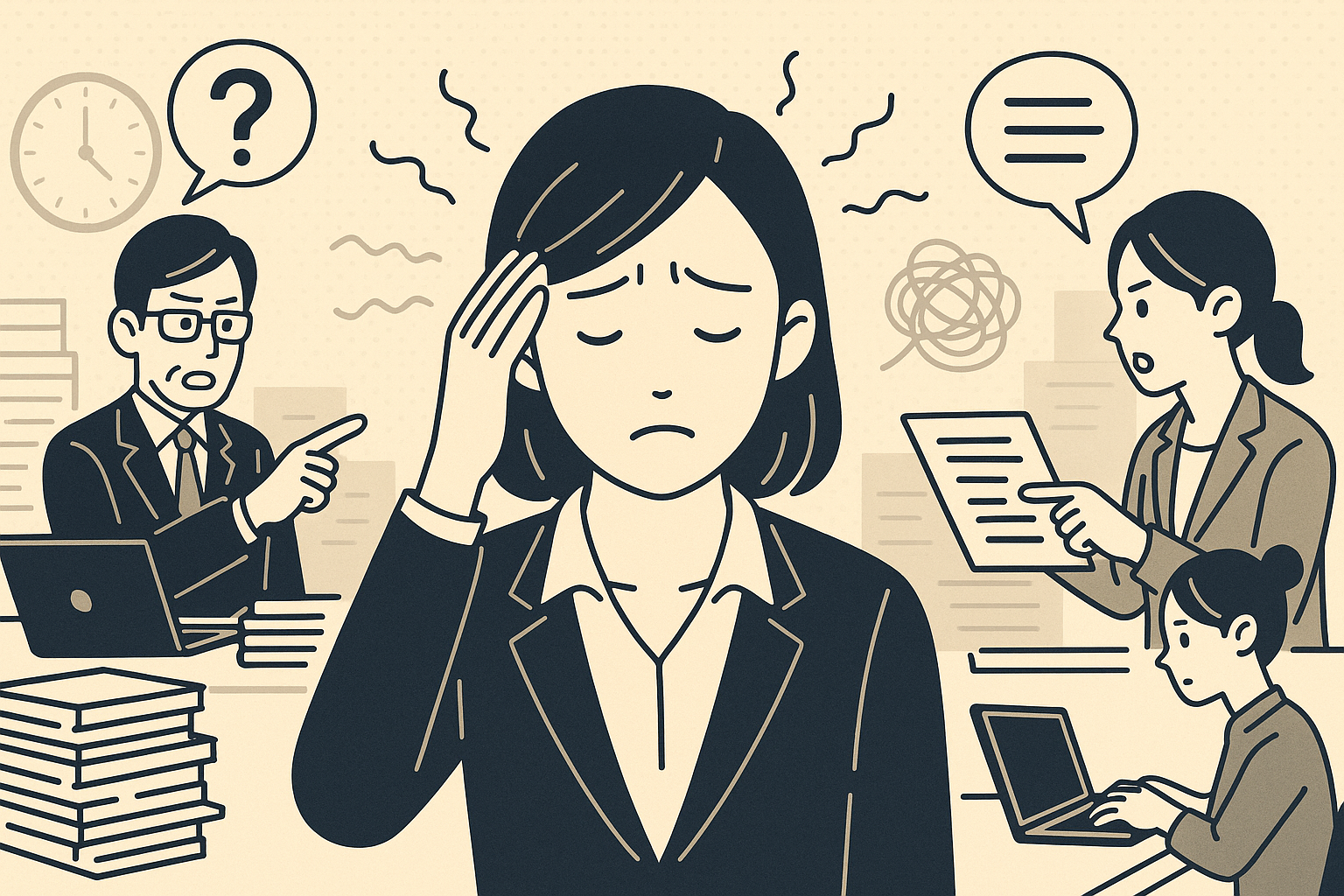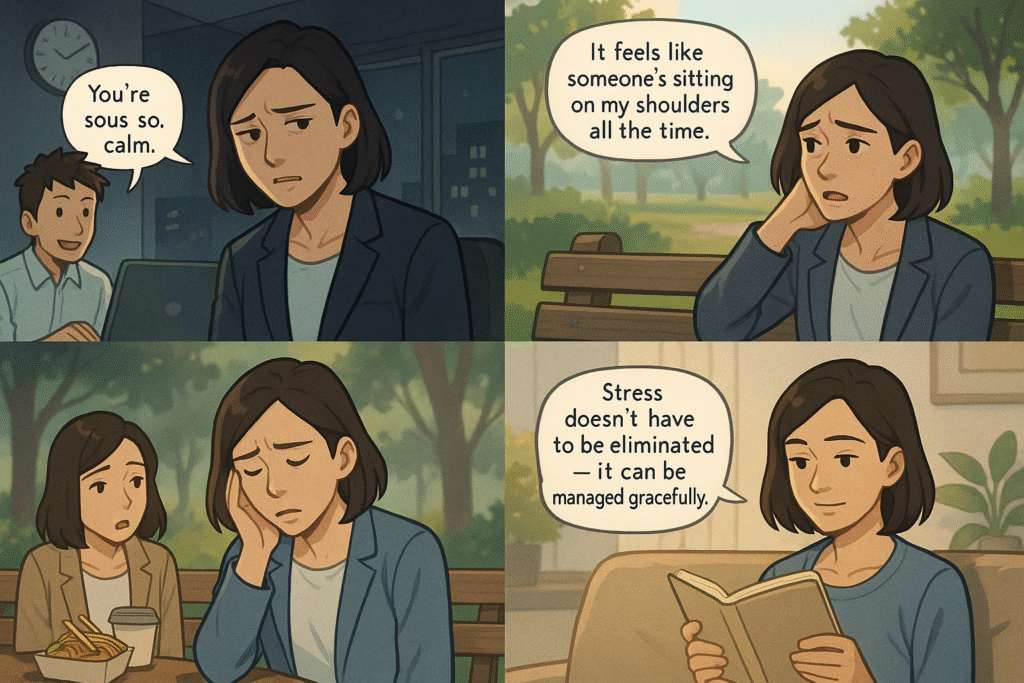In Japan, many working women quietly carry heavy stress despite their success—a legacy of cultural expectations and gender roles. This article explores why, highlights one woman’s journey, and shares practical tips for foreigners working in Japan. (Related article in Japanese)
- Understanding Stress in Japanese Working Women: Cultural Insights
- Current Challenges for Japanese Working Women
- What Foreigners Should Know About Workplace Stress in Japan
- A Story: When “Perfectionism” Turns into Stress
- Practical Stress-Relief Habits for Busy Professionals
- Conclusion: Redefining Strength with Mindful Stress Management
Understanding Stress in Japanese Working Women: Cultural Insights
In Japan, the concept of “ganbaru” (頑張る)—to persevere and give one’s all—has shaped work ethics for generations. Traditionally, this cultural value was complemented by expectations around gaman (enduring hardships silently) and wa (harmony within the group), which discouraged the open discussion of stress or struggle.
Historically, Japanese women faced additional burdens. A deeply ingrained belief held that women should protect the household while men pursued careers outside. Until recent decades, the workplace was often an environment shaped by dansonjohi (男尊女卑)—male-dominated attitudes where women were rarely expected to sustain long-term careers. The view that “women would eventually quit to marry” was pervasive.
While much has changed—gender equality has advanced significantly in modern Japan—traces of these old attitudes still subtly influence workplace culture today. This cultural history helps explain why many Japanese working women feel the need to prove themselves constantly, shouldering not only professional expectations but also societal scrutiny.

Current Challenges for Japanese Working Women
In contemporary Japan, working women have made great strides. Yet the legacy of past expectations lingers in subtle ways, creating unique challenges:
- Persistent stereotypes: Even today, some managers privately hold outdated beliefs like “she’ll probably quit after marriage.”
- Invisible expectations: Women in leadership roles often feel they must demonstrate perfection in both performance and communication, acting as role models not just for their teams, but for their gender.
- Work-life balance dilemmas: Many women still struggle to reconcile long hours with personal care, feeling guilty for taking time off.
- Social scrutiny: Decisions about marriage, childcare, or career ambitions often draw unwanted commentary, adding to emotional stress.
These factors contribute to a work environment where stress is not merely about workload, but about navigating complex, sometimes contradictory expectations.
What Foreigners Should Know About Workplace Stress in Japan
For foreigners working with or managing Japanese colleagues, it’s helpful to understand:
- Diligence and loyalty: Many Japanese workers are highly conscientious and committed to their roles, often going above and beyond what is formally required.
- Harassment awareness: Recent years have seen a strong cultural shift toward eliminating workplace harassment. Organizations today are increasingly cautious about reducing undue stress.
- Changing generational attitudes: Interestingly, some young workers today feel that this cautious atmosphere sometimes goes too far—they want more opportunities and challenges, and are eager to take on responsibility.
In short, while traditional respect for hard work remains strong, modern Japan’s workplace culture is actively evolving toward a more balanced, employee-friendly environment—yet with fresh tensions between old discipline and new freedom.
A Story: When “Perfectionism” Turns into Stress
One night, past 10 PM, a junior colleague told M-san, “You’re always so calm.”
She smiled in return, but inside, she was tense and exhausted. The stress of needing to appear competent, combined with her perfectionist tendencies, was weighing heavily on her.
Weeks later, she admitted during lunch in a nearby park: “It feels like someone’s sitting on my shoulders all the time.”
That realization sparked a change.
She noticed that her relentless drive to achieve was draining her. Even weekends were consumed by fatigue, unhealthy meals, and skipped self-care. The breakthrough came when she read a simple idea: stress doesn’t have to be eliminated—it can be managed gracefully.
This perspective shift led her to start small, mindful routines that prioritized pauses and self-awareness. One of her key habits was spending five minutes each morning writing in a structured journal—a moment of calm that allowed her to clear her mind before starting a busy day.

Practical Stress-Relief Habits for Busy Professionals
Inspired by M-san’s journey, here are simple practices that anyone can apply:
5-Minute Journaling
A structured journal with prompts like:
- Today’s mood
- What’s on your mind
- What not to do today
This helps declutter thoughts and set priorities clearly.
Micro-meditation
Pause for just one or two minutes, close your eyes, and focus on your breath. A quick reset that fits into even the busiest schedules.
“Not-To-Do” List
Intentionally decide what you won’t do today. This relieves mental pressure and avoids unnecessary multitasking.
Weekly Self-Check
Once a week, rate your well-being: skin, sleep, mood, appetite. This habit makes it easier to notice when your body and mind need care.
Emotional Labeling
When you sense discomfort in a work interaction, pause and name your emotion: “disappointed,” “hopeful,” “uncertain.” Naming it makes it easier to handle calmly.
Recommended items:
- 5-Minute Journal: Quick self-reflection designed for daily use.
- Hot Neck Pillow: Japanese warming pillow for stress relief at home.
- English-language Journal: Practice self-care while improving language skills.
Conclusion: Redefining Strength with Mindful Stress Management

M-san’s journey shows us that the true goal is not to erase stress but to learn how to coexist with it in healthy, sustainable ways.
Japanese working women are increasingly embracing a balanced, thoughtful approach—creating space to pause, reflect, and restore. Their practices offer valuable lessons for anyone seeking resilience in a demanding world.
If you adopt mindful habits—small moments to check in with yourself, set limits, and adjust your pace—you can thrive not by avoiding stress, but by living well alongside it.
In this evolving workplace culture, Japan’s mindful approach to managing stress serves as a positive, forward-looking example. Whether you work in Japan or elsewhere, this perspective can help you cultivate a career and life that feel sustainable, fulfilling, and meaningful.


Comments